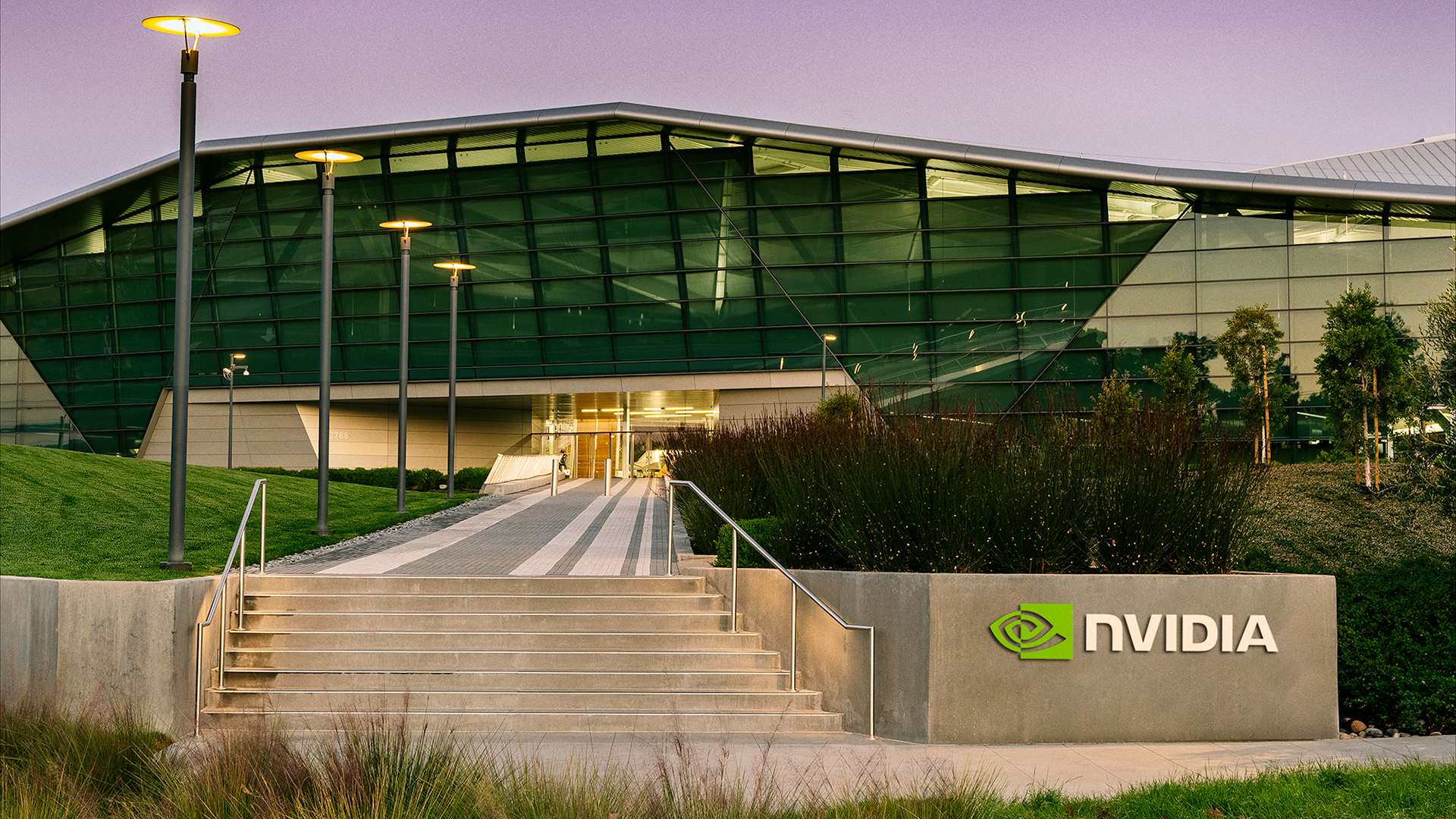Nvidia’s stock surge mints new employee millionaires, but many can’t yet enjoy their wealth
When the golden parachute becomes golden handcuffs instead.

The stock surge Nvidia is enjoying, largely because of its dominance in AI, has created quite a few new millionaires among the company’s employees. Unfortunately, many of them cannot yet enjoy their newfound wealth and still work long days and in stressful conditions, according to a recent Bloomberg report.
Nvidia’s stock price has risen more than 3,775 percent since 2019, meaning employees who receive stock grants as compensation have quickly become millionaires. You'd be mistaken if you thought they’d be living lavish lifestyles and retiring early. While these employees can purchase expensive sports and luxury cars and even have them custom-painted in the iconic Nvidia colors, those fancy cars spend more time in Nvidia’s parking lot than anywhere else.
Current and former employees say the work conditions at Nvidia include highly stressful days that don’t end until one or two in the morning, seven days a week. According to the ten people who spoke to Bloomberg anonymously, those working on engineering teams often work even longer days. Nvidia CEO Jensen Huang is known for fostering a culture of overworking, saying that he prefers to “torture (employees) into greatness” rather than fire them.
This might work in Nvidia’s favor for retaining employees because of how the stock packages are doled out: they don’t become vested until four years after they’re granted. If a stock package isn’t vested, the employee cannot sell it. Around the time the employee can sell one lot of shares, there’s already another for the worker to wait on.
Few companies in the tech industry share this same culture. In fact, there has been a cliche for years of a “rest and vest” culture. In this situation, employees sit around and play video games while they wait for their stock packages to vest. Not so Nvidia, though, where such an employee would face shame and ridicule from colleagues and managers alike.
In this way, a compensation tactic that used to be looked on as a golden parachute could now become a set of golden handcuffs instead. The new multimillionaires are buying their fancy cars and multimillion-dollar homes, but many of them could wait several more years before they can enjoy them.
How many of Nvidia’s employees are holding out for additional treasure troves of stock to become vested? According to Bloomberg, in 2023, 5.3 percent of the company’s employees left Nvidia. However, once Nvidia achieved its $1 trillion market capitalization, that attrition rate dropped by almost half to just 2.7 percent. To put this into perspective, the average turnover rate for the semiconductor industry is 17.7 percent.
Get Tom's Hardware's best news and in-depth reviews, straight to your inbox.
Despite the vast differences between the workplace culture at Nvidia compared to other semiconductor and Big Tech companies, most employees seem to approve of Huang's expectations and leadership style. His approval rating on Glassdoor has only dropped by a percentage point, to 97 percent, since last year.

Jeff Butts has been covering tech news for more than a decade, and his IT experience predates the internet. Yes, he remembers when 9600 baud was “fast.” He especially enjoys covering DIY and Maker topics, along with anything on the bleeding edge of technology.
-
vanadiel007 I don't see the problem. If you have stocks worth millions that are vested for 4 years, quit and take a part time job at a retailer or something else with low stress/working hour levels.Reply
Cash in 4 years later and never have to work again.
I gladly quit my job right now if I had millions worth of stocks that I can cash in in 2029. -
Avro Arrow I used to think that the Japanese were workaholics but it seems that the Americans passed them long ago.Reply -
JamesJones44 4 years vesting isn't all that bad, most silicon valley companies are 5 years, with the rare unicorns being 3 years or less to vest.Reply -
Heiro78 Reply
Not, the japanese business/ office culture is still worse in severity. America just spreads it to all industries so it averages out to be just as bad. And yes this is just a feeling versus hard numbers when comparing articles about japanese business men dying from overwork and knowing the overwork or american laborers and office folks.Avro Arrow said:I used to think that the Japanese were workaholics but it seems that the Americans passed them long ago. -
Heiro78 Also, this article doesn't reference the apparent divide between old and new employees with these stocks. Apparently the work being done at the company is a bit lopsided where the newer employees are taking the brunt of it all.Reply
Tom's hardware reported on it back in december and yahoo more recently.
https://www.tomshardware.com/pc-components/gpus/wealthy-nvidia-employees-are-taking-it-easy-in-semi-retirement-mode-even-middle-managers-make-dollar1-million-a-year-or-more-report
https://finance.yahoo.com/news/employees-joined-nvidia-5-years-160012281.html -
bit_user Reply
Are you for real, dude? It varies, but many tech jobs are as stressful as Nvidia's, but without the awesome stock valuation. Particularly at startups. Most startups don't reach a "liquidity event", either. So, the big payday is anything but guaranteed.The article said:Few companies in the tech industry share this same culture.
The "great resignation" happened because many people stuck in these stressful jobs finally had a decent set of options and could escape.
Au contraire! This was reported on Toms', but I'm not finding it due to the site's poor search engine:The article said:In fact, there has been a cliche for years of a “rest and vest” culture. In this situation, employees sit around and play video games while they wait for their stock packages to vest. Not so Nvidia, though, where such an employee would face shame and ridicule from colleagues and managers alike.
https://www.techradar.com/pro/nvidia-appears-to-have-a-major-problem-with-wealthy-middle-managers-who-do-barely-any-work-and-new-starters-arent-happy
Burn-out is a real thing. There need to be carrots and sticks to get the most out of people, but it's short-sighted to push them too far. I'd argue anyone using the word "torture", even in jest, is risking burnout. That could be part of the reason they had trouble with people coasting (see above).The article said:Nvidia CEO Jensen Huang is known for fostering a culture of overworking, saying that he prefers to “torture (employees) into greatness” rather than fire them. -
Eximo ReplyHeiro78 said:Not, the japanese business/ office culture is still worse in severity. America just spreads it to all industries so it averages out to be just as bad. And yes this is just a feeling versus hard numbers when comparing articles about japanese business men dying from overwork and knowing the overwork or american laborers and office folks.
American office culture just leaves us stuck at work when we shouldn't be. Over hiring in some scenarios but fearing cutting back payroll since that would mean less budget in the future. The big companies beholden to shareholders are the ones that do layoffs and other cost cutting measures. Having minimal vacation time or even accrual vacation time are all means to make people take less vacation, which means a lot of people sitting around when the workload is light. Of course we have industries like game development and software development that still seem to be in startup death march mode all the time.
Japanese culture hasn't gotten out of the 80s boom economy mindset. They still think more hours = more profit when that hasn't been true for a long time. They basically had infinite global and domestic demand which allowed them to sell everything they made from physical products to services in the aid of making physical products. When the rest of the world economy got up to speed they had market competition and the demand for Japanese goods plummeted in favor of cheaper Chinese goods and then Vietnam and India, and now Malaysia, and so on. -
Avro Arrow Reply
The difference is that Japanese corporations treat their employees like family while American firms just try to enslave them while giving them as little as possible.Heiro78 said:Not, the japanese business/ office culture is still worse in severity. America just spreads it to all industries so it averages out to be just as bad. And yes this is just a feeling versus hard numbers when comparing articles about japanese business men dying from overwork and knowing the overwork or american laborers and office folks.
Sure, back in the 20th-century, the Japanese had it way worse than the Americans but Japan has gotten better over time while the USA has gotten worse.